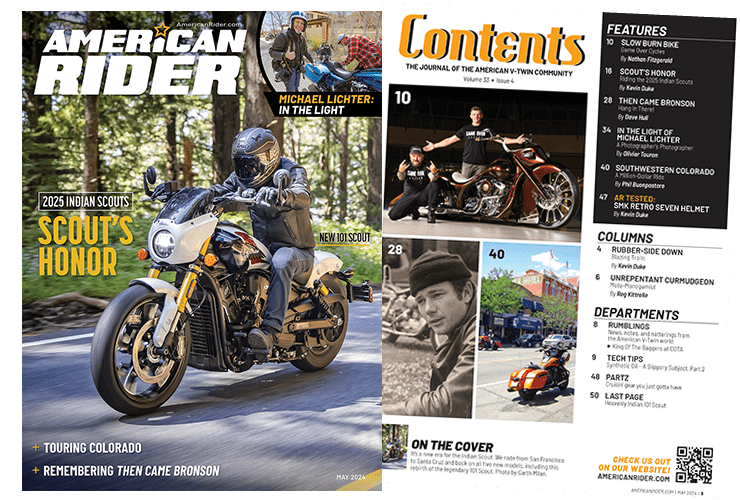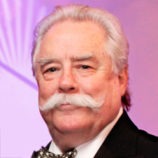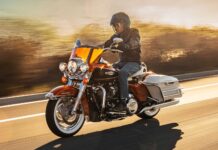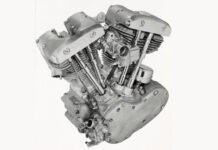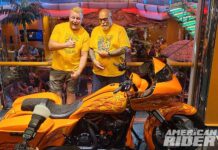Barton Smith was a grizzly bear hibernating for the winter. In 1942, living in the farm country of the Midwest, from January to May long-distance motorcycle travel was a very bad idea. Not only was the weather miserable, but the hard-packed roads turned quickly into mud.
Barton’s red and black 1937 80 cubic-inch flathead Harley-Davidson with ULH sidecar rig was kept in the tiny garage next to the cheap boarding house where he rented a room. She was never put up for the winter. Unless it was snowing or raining, he rode her every day. Like a fine horse she needed exercise. Barton made good use of the winter’s downtime by fiddling, adjusting or rebuilding anything that looked like it needed attention. Because of the war, new replacement parts became impossible to find, so Barton’s skills at rebuilding and remanufacturing were put to the test.
One of his inventions that allowed him to ride her during the winter was a waterproof canvas apron that fit over the tank and seat. Sitting on this lap robe, folding it back over his legs and securing it with clips he rode surprisingly warm and rainproof.
His plan was to go to the West Coast and get a job in a defense plant building planes or guns or anything to do his part for the war effort. Every day he reminded himself that with the change in the weather he would be on his way. Being practical he waited for the weather to break, but damn it, he wanted to get out there and do some real work.
On the first day of May he quit his job. He packed all his belongings in a gatemouth bag and lashed it down in the sidecar of the motorcycle. At 8:00 in the morning, Barton Smith left for the West Coast.
The rain came and went, as did the mud, but on his first night out he was lucky enough to find some high, dry ground. A mile off the main highway, Barton set up camp. He erected his tent and added an army cot, sleeping bag and wool blanket. He attached the platform he had devised to the back of the sidecar to create a cook table. The canvas lap robe did double duty as a windbreak. The cooking grill was taken out of the canvas bag and a rock ring was formed to make a firepit. His kitchen was laid out. The extra room in the sidecar allowed him to take anything he needed. Instead of being forced to throw his blanket on the ground and sleep at the mercy of the elements, Barton, a meticulous man, had thought out each aspect of his camp and having had plenty of time to himself during the winter, had honed every detail for this extended camping road trip. By any standards this was a well thought-out serious camp that any traveler would be proud of.
Over an open fire, coffee, beans, spuds and onions and a grilled steak was dinner. A bottle of bourbon, for snake bites and to ward off the cold, was sipped on for dessert. The sky was black, the stars shone so brightly that they hurt the eyes. A book could be read by starlight alone.
Barton watched the sky move and tried to identify the different constellations. He thought of his friends that told him he was crazy to go to the West Coast on a motorcycle. He would miss them. He hoped his family wouldn’t worry. He wondered about Betty, his girlfriend. She said she would wait to hear from him when he got to the Coast, that maybe she would join him. Somehow he guessed she would wait just long enough for someone else to ask her out on a date.
The “I don’t care box” in his brain was opened for a second but quickly closed. He wasn’t ready to assign his entire past to that “box” just yet. He didn’t want to lose any of these people completely, so he took a long time thinking about each one of them. Finished, he then escorted them to the back of the brain where they would be comfortable living together as ancient history. They could be visited once in a while, but they no longer sat at the front of the bus helping to drive.
It was nearly midnight before Barton rolled out his bag, added the blanket and tested the cot. Eventually, the silence, the cold, the blackness and his breathing created a four-part harmony that sang the song of restful slumber.
In the morning Barton congratulated himself. “Damn, I make a damn good cup of coffee, if I do say so myself.”
Eggs and bacon were fried in the same pan as dinner. Spuds and onions were added as well. He ate well and took pride in what an excellent camp he had set up and how self-reliant and well-prepared he was. It was over 1,000 miles to the Coast and he could save a lot of money living rough and passing up hotels. He ran some monetary figures in his head as he ate breakfast.
After the meal he boiled water for both washing dishes and to do his morning cleanup. He broke out his brand new black-handled straight razor and attached the strop to the handlebars, giving the razor 20 strokes on each side. Dipping a cloth in the boiling water, shaking it to create the perfect temperature, he held it to his face to soften his beard. Applying shaving cream and using the mirror on the motorcycle, he used the razor for the first time. “Wow, that’s a damn fine razor. That’s the best shave I’ve ever had.” Talking out loud to himself, he allowed a small amount of swearing.
The cloth was again dipped in the boiling water; shaking it, cooling it, he then removed the shaving lather from his face and continued washing.
With his grooming out of the way Barton cleaned the dishes, deconstructed his tent and cot, rolled his bedroll, packed everything and put out the fire. The ashes were kicked out and spread, the fire ring rocks were scattered and as he rode back to the highway the only thing that said he was ever there were his tire tracks.
On Saturday, May 2, 1942, he started the second day of his trip towards the West Coast.

